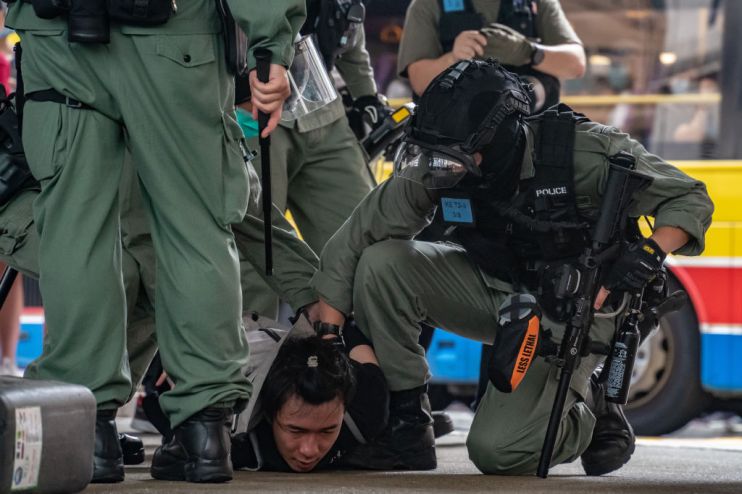Hong Kong police arrest 70 protestors under controversial new security law

Police in Hong Kong have arrested more than 70 protestors on the first day of a new law handing Beijing sweeping powers over the city.
Chinese President Xi Jinping yesterday signed into effect new legislation allowing police to arrest people for subversion, secession and collusion with foreign forces in a law that effectively bans protests. Hong Kong citizens can also be arrested for “inciting hatred of China’s central government” and damaging public transport facilities.
Those found guilty are likely to be sentenced to a minimum of three years in prison, with the maximum being a life sentence.
On its first day enshrined in law today, Hong Kong police said they arrested more than 70 people on various charges, from unlawful assembly to violation of the national security law. Journalists were pepper sprayed and doused with water cannons.

The first demonstrator to be detained was arrested for carrying a flag emblazoned with the words “Hong Kong independence”. Police claimed the slogan was “suspected to be inciting or abetting others to commit secession and may therefore violate” the new security law.
Hong Kong police confirmed dozens of further arrests for offences including “illegal assembly, violating the Hong Kong national security law, obstructing police officers from performing their duties and possession of offensive weapons”.
Hong Kong citizens were hear yelling: “Scrap the national security law!” and “Hong Kong independence, the only way!” Hong Kong police said verbal calls for independence and the carrying of pro-independence flags were both punishable under the new law.
The protests came on the 23rd anniversary of Hong Kong’s handover from Britain to China. At a ceremony marking the occasion early this morning, Hong Kong city leader Carrie Lam was seen sipping champagne with Chinese communist officials.
In a press conference this afternoon, Lam said the purpose of the legislation “was not just to punish, but also to deter”, and that some human rights were “not absolute”.
She added that the new security law was “the most important development in relations” between mainland China and Hong Kong since the handover.

The move has sparked international outrage, with global leaders voicing concern that China is tightening its grip further afield.
Foreign secretary Dominic Raab yesterday called the new law “a grave step”. He added that China’s ignorance of its international obligations regarding Hong Kong was “deeply troubling”.
Prime Minister Boris Johnson added that he was “deeply concerned” about the move, but added he would not be drawn into “Sinophobia” over other issues, such as the decision to allow Huawei to build part of the UK’s 5G infrastructure.
But the US reacted more flagrantly, immediately imposing visa restrictions on Chinese officials linked to the security law, eliminating Hong Kong’s special status under US law, and committing to end defence and technology exports.
US secretary of state Mike Pompeo issued a statement, saying:“The CCP [Chinese Communist party] promised Hong Kong 50 years of freedom to the Hong Kong people, and gave them only 23.”
He added that the US would “not stand idly by while China swallows Hong Kong into its authoritarian maw”.
China has hit back at the outcry, denouncing “interference” in its internal affairs.
Zhang Xiaoming, the official Chinese spokesman, lambasted the Western reaction today, saying the new law “did not concern” foreign countries and accusing those who were considering sanctions of thinking like “bandits”.
“We haven’t provoked you. What gives you the right to be aggressive with us?” he told reporters.
Before the Open: Get the jump on the markets with our early morning newsletter